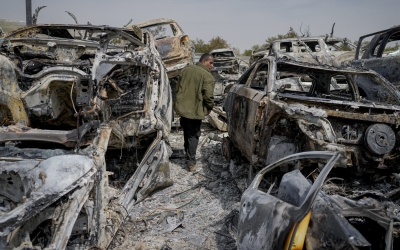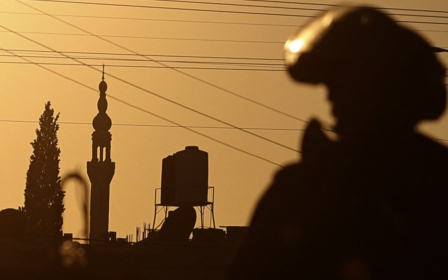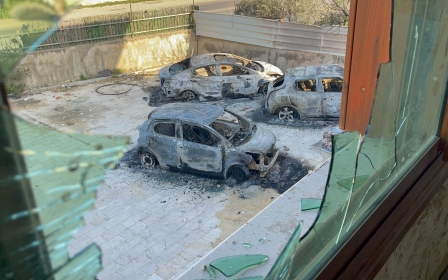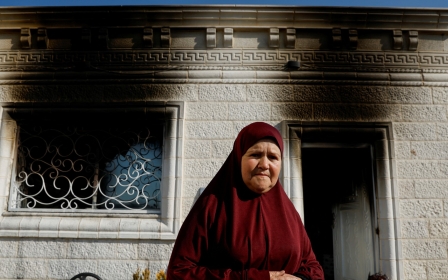Huwwara: A town of olives, gold traders and stolen lands
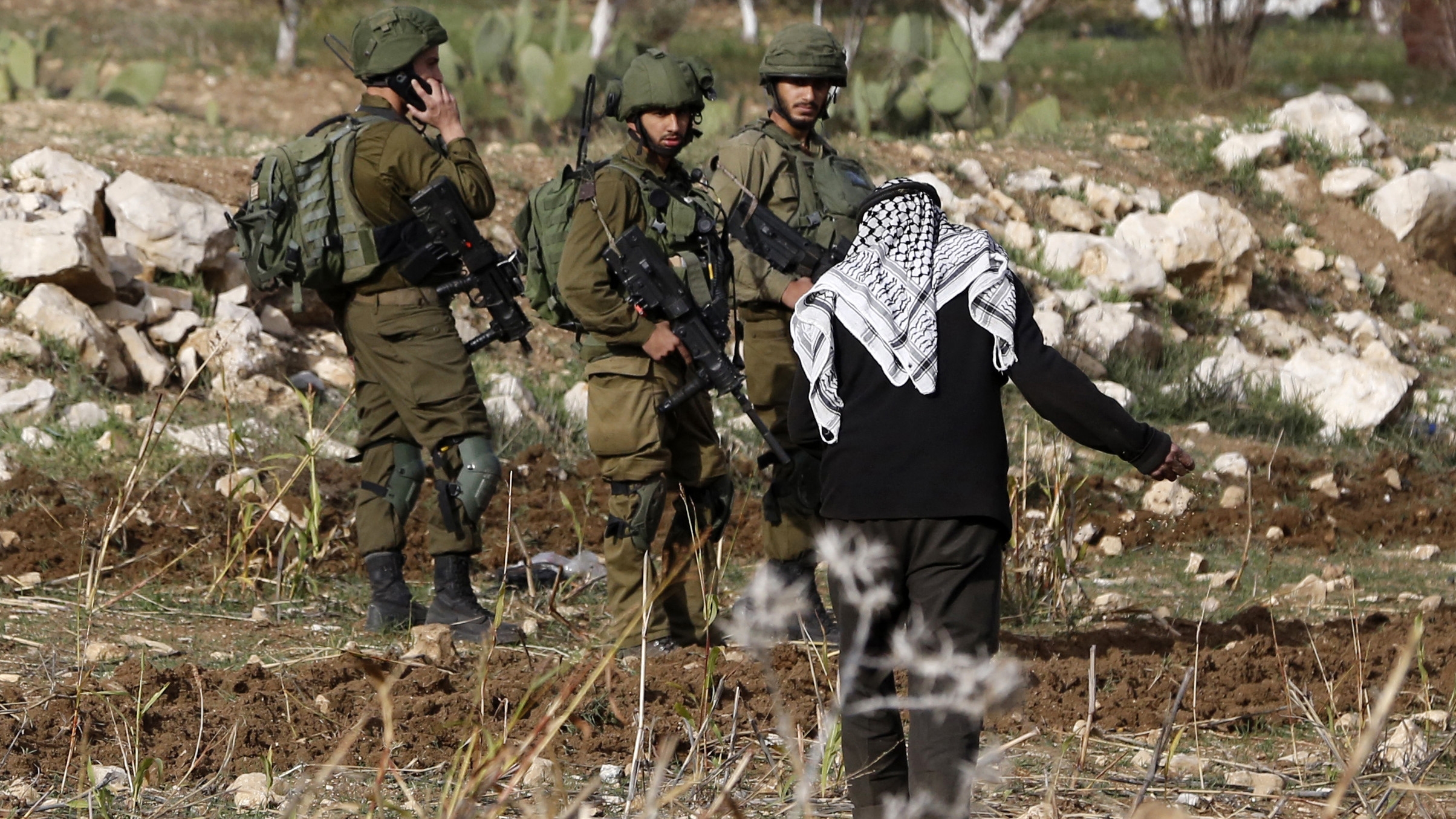
Cutting through the heart of Huwwara, the usually quiet scenic highway connecting the Palestinian cities of Ramallah and Nablus turns into a bustling town artery.
The area is seldom empty of people visiting the shops lining the town's main street and motorists driving through to nearby Palestinian villages.
However, as in many Palestinian towns, Huwwara's main street is also used by Israeli settlers to reach illegal settlements in the northern occupied West Bank.
Israeli soldiers also have a heavy presence in order to protect settlers, constricting the freedom of movement for Palestinians.
Stolen plain
New MEE newsletter: Jerusalem Dispatch
Sign up to get the latest insights and analysis on Israel-Palestine, alongside Turkey Unpacked and other MEE newsletters
The lands of Huwwara, which derives its name from the type of white soil it is famous for, are covered with olive trees, planted neatly in ornate rows, a sign of the town's long history.
Its population, currently at more than 7,000, historically depended on agriculture for a livelihood. However, as Israeli settlers began encroaching on their lands, reducing agricultural areas, many residents have been forced over the years to work in trade or take government jobs instead, according to Raed Muqadi, researcher at the Land Research Centre.
The people of Huwwara are also associated with gold. For years, merchants have been working in the gold trade and selling the precious metal in shops in their town and elsewhere, such as in Nablus and Ramallah.
Although Huwwara's agricultural plain is considered one of the largest in Palestine, the increase of Israelis settling on or near Palestinian lands has prevented residents from benefiting from it.
Before the 1967 Arab-Israeli war, Huwwara's main street was a dirt road used by the Jordanian army to reach its base camp on the plain. After the war, the Israeli occupation army seized the military camp and turned it into its own base. It also set up a training area for soldiers on 17 dunams (1.7 hectares) of land it confiscated from the town and the neighbouring village of Awarta, Muqadi said.
"Since then, occupation soldiers have harassed the Palestinian farmers in the plain, which was a food basket for the people of Huwwara and neighbouring villages," he told Middle East Eye.
"With the increase in the attacks of soldiers and settlers and preventing farmers from using their lands, the townspeople have minimised their reliance on agriculture."
Although the town spans 8,000 dunams, the area available for building houses does not exceed 1,000 dunams, because 75 percent of its lands is classified as Area C, which is under the full control of the Israeli military.
Since the beginning of the Israeli occupation and the building of settlements, Muqadi said, residents are regularly prevented from passing through the main street, from urban expansion, and even from opening shops.
With the confiscation of lands in favour of settlements, the blocking of construction and denial of access to agricultural lands, there is not much left for the people of Huwwara.
A devastated town
In the 1970s, the Israeli forces widened and paved the dirt road in the middle of the town, but not for the benefit of the Palestinians. The construction was to serve the settlers who use it to reach their settlements, especially Yitzhar and Bracha, which stole more than 1,100 dunams of Huwwara land, according to the town's municipality.
These settlements are inhabited by extremist Jewish settlers who reject the Palestinian presence in the West Bank and regularly use intimidation tactics and violence against Palestinians living in surrounding towns and villages.
Palestinians have for years suffered from attacks by settlers, protected by Israeli soldiers, that have included burning houses and crops, stealing fruits, and beating residents. According to the UN humanitarian affairs body OCHA, there have been 59 settler attacks against Palestinians in the West Bank so far this year, 18 of which resulted in casualties. It counted 622 attacks in 2022.
The most recent settler attack was, however, the most violent Huwwara's residents have experienced in years. On 26 February, Israeli settlers rampaged through several towns in the West Bank, including Huwwara, in revenge attacks, following a shooting by a suspected Palestinian that left two Israeli settlers killed.
For hours, settlers burnt and attacked Palestinian property and homes, with families still inside. At least one Palestinian was killed and nearly 400 wounded in the attacks.
"During the Second Intifada, from 2000 to 2004, the people suffered as a result of the sadistic practices of the occupation as it pushed its military tanks into the centre of Huwwara, closed off half of the town, and demolished a number of houses," Muqadi said.
"They turned into a devastated town."
Time of Nakba is gone
The strategic location of Huwwara, nine kilometres from the city of Nablus, gave it a privileged position, which at the same time made it susceptible to Israeli ambitions.
The historical character also affects part of the town, as there is a site called Al-Khirba dating back to the Byzantine era, and its traces are still visible.
'We live here without thinking of leaving. The time of Nakba is gone forever'
- Saeed Ahmed, Huwwara resident
Saeed Ahmed, a resident of Huwwara, said living there is not like living in any other place, describing it as an unusual town, "remaking its own life from the ashes of Israeli racism against it."
He said the town's houses were built in the past from dried mud, then of bricks, and then of the white stones that several Palestinian cities are known for extracting.
However, these houses, no matter how different the nature of their construction over time, have been a witness over the years to the insistence of their residents to live in them without hesitation, regardless of the difficulties and obstacles.
"My father was a farmer and advised us to walk in his footsteps, but now we cannot reach our land. We see it from afar, and we can't approach it," Ahmed said.
"Now the settlers come to our homes and burn them, but we insist on returning every time to reclaim our lives.
"We live here without thinking of leaving. The time of Nakba is gone forever," he said, referring to the expulsion of thousands of Palestinians from their homes as Israel came into existence in the late 1940s.
Middle East Eye delivers independent and unrivalled coverage and analysis of the Middle East, North Africa and beyond. To learn more about republishing this content and the associated fees, please fill out this form. More about MEE can be found here.


